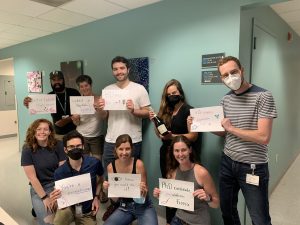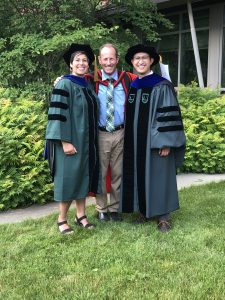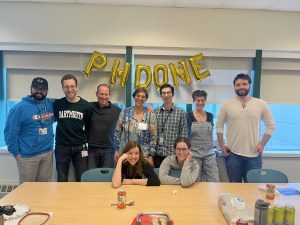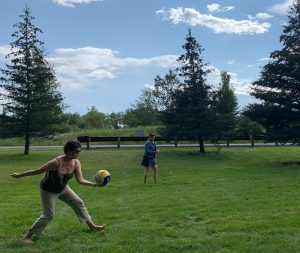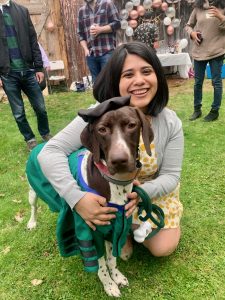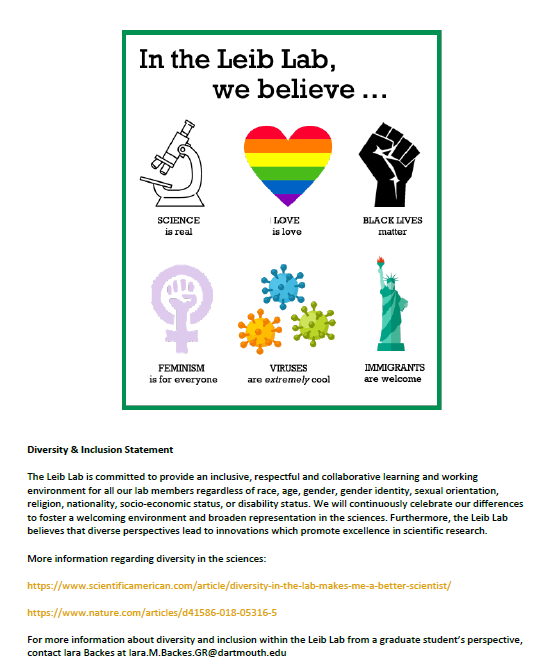News
Congratulationsto Fiona McEnany for passing her qualifying exam on August 3rd, 2022! We are thrilled for her success and thrilled for the excuse to celebrate with viral puns, swimming, washers, and cheer.
Congratulations graduates! Richard and Iara were robed and regaled on June 11th, 2022. Just look at those good looking PhDs:
Congratulations to Matt Slein for passing his qualifying exam on June 8th, 2022! To no one’s surprise, he passed with flying colors and lots and lots of virology fun facts 🙂
Congratulationsto Iara Backes for successfully defending her thesis on February 28th!
Congratulations to Roberto Alers-Velazquez for being accepted to Cornell’s Rising Star Program! A STAR pumpkin carver and know a nationally recognized star postdoc! Read more HERE
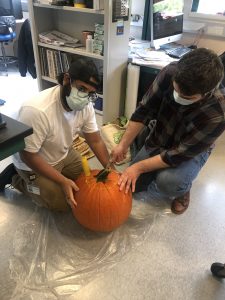
Congratulationsto Fiona McEnany for being selected as New Hampshire’s Young Person of the Year! First New Hampshire, next The World… [Read more HERE] .
Congratulations to Abigail Dutton for passing her qualifying exam on July 23rd, 2021. Congratulations also to her lab for immediately reminding Abigail of her humility in a daring game of volleyball (nice moves, Audra!).
Congratulationsto Stacey Ceron for winning the Guarini Diversity Award, 2021. You are so deserving and we are so proud! Read more here.
Congratulations to Stacey Ceron for successfully defending her thesis on May 4th, 2021!
Congratulations to Chaya Patel for successfully defending her thesis on November 10th.
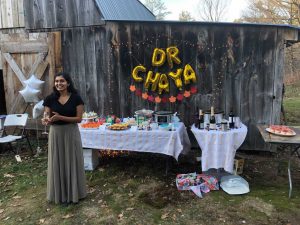
Read all about the the Leib Lab’s efforts on rapid COVID-19 diagnostics.

Research
Herpes simplex virus (HSV) is a highly evolved and successful pathogen with a very wide distribution in the human population, close to 100% in some populations. HSV often manages to forge the near-perfect lifelong relationship with us, its human host. Despite the availability of excellent antiviral drugs such as acyclovir and valtrex, HSV is refractory to cure. This is due to the ability of HSV to invade neurons, to translocate to neuronal cell bodies, and establish latent infections therein. Our over-arching interest is to understand how HSV modulates the immune system of the host. This immune-modulation allows HSV to successfully establish latency, and more remarkably, to allow the virus to escape from the immune host to infect other susceptible individuals in the population. Our experimental approach is to use forward and reverse genetics to introduce mutations into the viral genome to generate recombinant viruses. We then use these recombinant viruses in vitro and in vivo to allow the study of viral pathogenesis at the molecular level, and to examine the outcome of the host-pathogen battle.
Recent Publications
Models of Herpes Simplex Virus Latency.
Canova PN, Charron AJ, Leib DAViruses. 2024 May 8;16(5) doi: 10.3390/v16050747. Epub 2024 May 8.
PMID: 38793628
Asymptomatic neonatal herpes simplex virus infection in mice leads to long-term cognitive impairment.
Dutton A, Patel CD, Taylor SA, Garland CR, Turnbaugh EM, Alers-Velazquez R, Mehrbach J, Nautiyal KM, Leib DAbioRxiv. 2024 Apr 22; pii: 2024.04.22.590596. doi: 10.1101/2024.04.22.590596. Epub 2024 Apr 22.
PMID: 38712140
Effector functions are required for broad and potent protection of neonatal mice with antibodies targeting HSV glycoprotein D.
Slein MD, Backes IM, Garland CR, Kelkar NS, Leib DA, Ackerman MECell Rep Med. 2024 Feb 20;5(2):101417. doi: 10.1016/j.xcrm.2024.101417. Epub 2024 Feb 12.
PMID: 38350452





